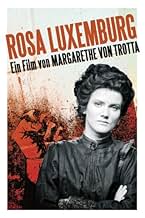Añade un argumento en tu idiomaAfter years of political agitation, Rosa Luxemburg, Karl Liebknecht, and Leo Jogiches form a revolutionary German party, the Spartacists.After years of political agitation, Rosa Luxemburg, Karl Liebknecht, and Leo Jogiches form a revolutionary German party, the Spartacists.After years of political agitation, Rosa Luxemburg, Karl Liebknecht, and Leo Jogiches form a revolutionary German party, the Spartacists.
- Premios
- 4 premios y 4 nominaciones en total
- August Bebel
- (as Jan-Paul Biczycki)
Argumento
¿Sabías que...?
- CuriosidadesRainer Werner Fassbinder was planning to direct a film on Rosa Luxemburg in early 1983. Jane Fonda had already agreed to play the lead when Fassbinder suddenly died in June 1982.
- PifiasThe historical Rosa Luxemburg was short (about five feet, 150 cm), had dark brown eyes and a pudgy face. In this film, she is played by Barbara Sukowa who is much taller (5 foot 5, 165 cm), has gray-green eyes and sharp features.
- Citas
[first lines]
Rosa Luxemburg: Sonja, you are bitter about my long enprisonment and ask: "How is it that some people may decide the fate of others?". My dear, all history is based on people deciding the fate of others and that is deeply rooted in the conditions of our material existence. The only way to change this is by painful upheaval. You ask: "What is it all for?" "What for" conveys nothing about the totality of life and its many forms. Why do blue tits exist? I really have no idea but I'm glad they do exist and it gives me great confort when suddenly, over the prison wall, I hear them call in the distance. Sonitschka, be cheerful and don't fret. Things will turn out well, believe me. Greetings to Karl. Many kisses, Rosa.
- ConexionesFeatured in Die Neugier immer weiter treiben (1995)
I don't know much about Luxemburg, but as the film portrays her, she was a very forceful, compassionate, and strident devotee of peace and justice for the working class. She was a member of the Socialist Democratic Party in Germany, and she also spent some time in her native Poland. Apparently she was also Jewish. Her longtime lover and working companion was also a Socialist writer who was Polish.
"Rosa Luxemburg" follows many of the major events in Rosa's life. We see her giving speeches, writing articles, and pressing the Socialist Democratic party elders for quicker movements toward "revolution." Ultimately, Rosa wanted an overthrow of the "old order," meaning the monarchic/industrial/fascist forces, and direct control of the political system by the workers themselves. She did not advocate violent means to do this, but nevertheless was painted as a dangerous radical and was thrown in jail nine times.
I enjoyed this film immensely and found it sad but extremely important. Viewers who enjoy this film might also check out "The Burning Season," "Entertaining Angels," and "Daens."
- James B.
- 22 nov 1999
- Enlace permanente
Selecciones populares
- How long is Rosa Luxemburg?Con tecnología de Alexa
Detalles
- Fecha de lanzamiento
- Países de origen
- Sitio oficial
- Idiomas
- Títulos en diferentes países
- Роза Люксембург
- Localizaciones del rodaje
- Empresas productoras
- Ver más compañías en los créditos en IMDbPro
Contribuir a esta página



















